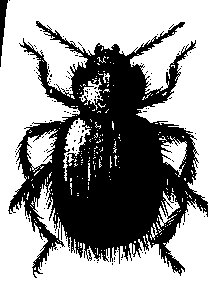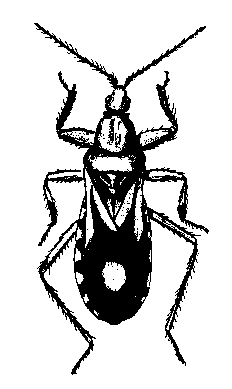Blackflies, and
God's Other
Punishments

If you don't live in the north woods, you won't understand what I mean by this. Vacationers who come for a week in August have little idea that the year-round folks have just survived plagues rivaling those visited on Pharaoh's Egypt. From early May to late July, the in-crowd's exoskeletal. Ticks make an early go of it: climbing to the tips of grass blades, they will hitch a ride on any passing mammal but seem to prefer me. After a half hour's walk in the field I find a dozen crawling up my legs. They hide in clothes, in sheets. I wake to the sensation of one plodding up my back, seeking a place to burrow and bloat.
 All nature clamors for our blood, and who can blame it? Bugs seek nothing we don't seek for ourselves: to eat before being eaten, to be fruitful and multiply. But what designing genius fashioned the mosquito? Who decided that it needed seven mouth parts --- no more, no less --- to grip and drill and pump and suck? And who developed the tag-team format whereby, just as the mosquitoes tire in July, the deerflies arrive to burrow through our sun-warmed hair and chew our scalps?
All nature clamors for our blood, and who can blame it? Bugs seek nothing we don't seek for ourselves: to eat before being eaten, to be fruitful and multiply. But what designing genius fashioned the mosquito? Who decided that it needed seven mouth parts --- no more, no less --- to grip and drill and pump and suck? And who developed the tag-team format whereby, just as the mosquitoes tire in July, the deerflies arrive to burrow through our sun-warmed hair and chew our scalps?
There are advantages, I suppose, to living in a country under siege. For one thing, the bugs, along with the winters, keep the human population in check. Or, counting your blessings, you could say that only during bug season does your skin feel fully alive. And if, like me, you're a philosophical sort, you might welcome the bugs as a spiritual challenge, and ask what they can tell us about the place of suffering and imperfection in our lives.
 All right, I admit it. I suppose it is perverse of me to go outdoors on a breezy, sunny spring morning, and walk past wildflowers nodding in the meadow down to my quiet cabin in the woods, all so that I can shut myself up and think about suffering. Well, it's tough work, but somebody's got to do it. And perhaps my life circumstances have pushed me, more insistently than most, to consider how a flawed life can still be a full one, how broken dreams can bring us more fully awake.
All right, I admit it. I suppose it is perverse of me to go outdoors on a breezy, sunny spring morning, and walk past wildflowers nodding in the meadow down to my quiet cabin in the woods, all so that I can shut myself up and think about suffering. Well, it's tough work, but somebody's got to do it. And perhaps my life circumstances have pushed me, more insistently than most, to consider how a flawed life can still be a full one, how broken dreams can bring us more fully awake.
Traditional religion teaches us to accept our afflictions as belonging to a larger scheme beyond mortal grasp. We're to trust the one or ones in charge. As I heard one unhappy young woman say recently, "I guess God's got His rhymes and reasons." It was late on a Friday afternoon, in the employees' lounge of a school for developmentally disabled children, and at the end of a long week a child in this woman's care had been hospitalized for seizures. It would indeed be comforting to think that the suffering of these children, with their scrambled circuits and skewed limbs, belonged to some larger dispensation of justice and mercy. But this woman did not feel comforted. Laying her head on her arms, she announced her intention to cash her paycheck, go home, and drink herself numb.
But maybe we're asking the wrong thing of God. Rhyme and reason, after all, are human values, not divine ones. Wanting human suffering to fit some divine plan is like wanting to fly an airplane above tornado wreckage and see that it spells out song lyrics or a cure for acne. At some point in life, in the face of illness, violence, accident, or injustice, each of us confronts the possibility that rhyme and reason may not be on God's agenda. This, of course, leads many people to dispense with God and religion altogether. In workshops I've led, when people explain their reasons for turning away from religion, most often I've heard them cite some instance of suffering, either global or personal: religion hasn't ended war; it doesn't explain why a boy's sister had to die of leukemia. I'm not sure how to answer such charges except to suggest that perhaps we shouldn't turn to religion for solutions and explanations of this sort. The first of Buddhism's Four Noble Truths is the one that our experience most easily confirms: that to be human is to suffer. God, the power that creates and sustains the universe in each moment and has given us our very lives, doesn't owe us reasons.
Philip Simmons
(©2002 Bantam Books)